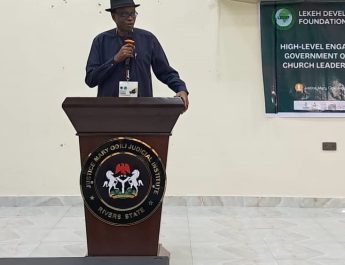The Presidential Enabling Business Environment Council (PEBEC), insists that Nigeria loses over $6.7 million on daily basis due to inefficiencies in ports operation, but the Nigerian Ports Authority (NPA) profers possible solution
By Edu Abade
Nigeria may have been losing as much as N2.5 billion, and equivalent of $6.7 million, to inefficiencies in ports operation on daily basis, according to the Presidential Enabling Business Environment Council (PEBEC).
PEBEC made the revelation at a forum where the leadership of the Nigerian Ports Authority(NPA) insisted on a one stop shop for trade facilitation as a possible solution to the lingering menace.
Speaking at the inauguration of the Ports and Customs Efficient Committee, in Lagos on Thursday, April 24, 2025, the Executive Secretary of PEBEC, Prince Zara Mustapha, said the development has not only brought about missed opportunities, it has also resulted in jobs not created and goods not delivered.
Mustapha said further that the ports are not just points of entry and exit, they are also the main channels of trade, she noted that the ports are where the story of commerce begins and ends for importers, exporters, logistics providers, and countless other small and large businesses which survival depends on the flow of goods across borders.
The PEBEC boss said, “Today’s gathering is not just another meeting. It is the beginning of a multi-stakeholder movement, a coordinated, solutions-driven effort to reform and reimagine one of the most critical points of interaction between our government, our businesses, and the global economy: our ports.
“Let me begin with a simple truth: ports are not just points of entry and exit, they are the main channels of trade. They are where the story of commerce begins and ends for importers, exporters, logistics providers, and countless small and large businesses whose survival depends on the flow of goods across borders.
“Unfortunately, that flow has been anything but smooth in Nigeria. According to recent data, Nigeria loses approximately 2.5 billion naira, equivalent to $6.7 million, every single day due to inefficiencies in port operations and service delivery. This amounts to over 912.5 billion Naira ($2.4 billion) annually.
“These are not just numbers. These are missed opportunities. They represent jobs not created, goods not delivered, investments not realized, and economic growth that is unnecessarily delayed.
“This committee, the Ports and Customs Efficiency Committee has been established to change this narrative. To go beyond identifying the problems we already know, and to begin implementing the solutions we all agree are long overdue.
“At PEBEC, our mandate has always been clear: to remove bureaucratic and legislative constraints to doing business in Nigeria.
“That is why this committee is so important. The Ports and Customs Efficiency Committee is not an observer group. It is an action-oriented, high-impact body charged with driving sustainable improvements in service delivery at Nigeria’s ports, working hand in hand with agencies like the Nigerian Ports Authority (NPA), the Nigeria Customs Service (NCS), terminal operators, shipping companies, freight forwarders, logistics providers, exporters, manufacturers, and policymakers. This is a reform ecosystem. And everyone in this room is a vital part of it.
“The Ports and Customs Efficiency Committee was established with four primary objectives namely to identify systemic inefficiencies and bottlenecks affecting cargo movement and Customs processing at Nigerian ports, to implement practical, targeted solutions that reduce delays, streamline procedures, and improve coordination between agencies; to enhance transparency, accountability, and predictability in port and Customs operations; and to deliver measurable improvements in cargo dwell time, stakeholder experience, and Nigeria’s competitiveness as a regional trade hub.
“This committee is designed to be inclusive, not performative. Every sector represented here today, public and private, brings a unique perspective and a valuable piece of the solution. That’s why this is not a top-down reform. It is co-created, co-owned, and co-implemented.
“By improving efficiency at our ports, we can: Drastically reduce cargo dwell time and turnaround for vessels, eliminate duplicative documentation and manual processes that cost both time and money, build trust through data-driven transparency and real-time information sharing, increase customer satisfaction for importers, exporters, and logistics operators, and ultimately, position Nigeria as a leading trade and logistics hub in Africa under the African Continental Free Trade Area (AfCFTA).
“This is not just about reform. This is about resilience. About unlocking the full potential of Nigeria’s economy in a global landscape that rewards speed, efficiency, and coordination.
“To be effective, this committee will operate on four guiding principles some of which include collaboration – No agency or company can do this alone. We must work across boundaries and mandates. Transparency – Clear service timelines, escalation mechanisms, and performance data must be made visible to all stakeholders. Responsiveness – Feedback must not only be collected; it must be acted upon. Accountability – There will be targets. There will be timelines. And there will be reporting.
“PEBEC will serve as the coordinating secretariat, providing technical support, facilitating inter-agency cooperation, and ensuring that this committee’s work is aligned with national reform priorities and measurable outcomes.
“This committee is not a task for the government alone. It is a call to action for terminal operators to improve infrastructure and turnaround times, for shipping companies to increase efficiency and reduce delays, for freight forwarders to uphold compliance, and for regulators to reduce bureaucracy and enable trade.
“It is a call for shared ownership of a shared problem, and a commitment to deliver a shared solution.
“As we commence our work today, let us remember that reforms don’t happen in rooms, they happen through consistent action. Let today be the start of something real, something measurable, and something lasting.
“We owe it to ourselves, to our institutions, and most importantly to the Nigerian people whose livelihoods depend on the efficient movement of goods through our ports.
“Let us move from challenges to change. From dialogue to delivery. From inefficiency to impact. Together, we can build a port system that works. A customs system that performs. And an economy that thrives.”
Similarly, the Managing Director of the Nigerian Ports Authority (NPA), Dr. Abubakar Dantsoho, said that the authority is currently addressing four major pillars that are critical to repositioning the nation’s seaports and making it compete effectively with regional counterparts.
According to the NPA boss, investment in infrastructure, equipment, technology, and human capacity would improve competitiveness and operational efficiency of the nation’s seaports.
Dantsoho noted that port infrastructure, particularly in Apapa and Tin Can Island Ports, is aged and in dire need of rehabilitation.
“Tin Can was constructed about 48 years ago, Apapa almost 100 years ago—yet no major rehabilitation has taken place all these years,” he said.




